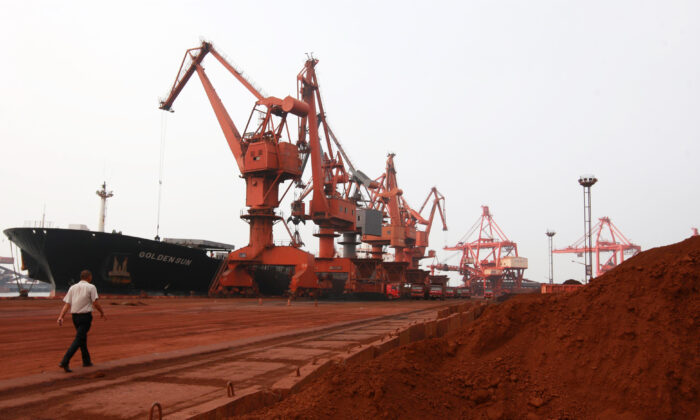Chinese leaders have seen rare earths as a kind of secret weapon that will catapult China to success. Rare earths can also be used to serve peace and enhance security.
By Lawrence Solomon, originally published by The Epoch Times
Commentary
“The Middle East has oil. China has rare earths,” Chinese paramount leader Deng Xiaoping presciently said in 1992, as he weaponized rare earths for their strategic advantages.
The United States and the rest of the West are today utterly dependent on China’s rare earths—a term for 17 metals and compounds that tend to be so thinly dispersed in terrain around the world that mining them becomes expensive.
But Canada not only has oil, it has rare earths, too, an estimated 15 million metric tons of them. If just 1 percent of those rare earths could be brought to market each year, they would exceed China’s entire annual production and far exceed China’s total exports. Even a fraction of that 1 percent would suffice to remove China’s stranglehold over the West, create some semblance of a functioning market in rare earths, and enhance the West’s security.
The extent of China’s stranglehold—it accounts for 80 percent of U.S. imports of rare earths—was highlighted by U.S. Sen. Tom Cotton (R-Ark.) in a report released Feb. 19.
“These 17 elements are required to build many commercial and military electronics, from taptic engines, which allow an iPhone panel display to imitate a physical button, to the guidance systems that allow U.S. Air Force missiles to accurately hit their targets,” he wrote.
Regarding rare-earth magnets, Cotton said that “China is so dominant in this specific, critical application of rare earths that the Pentagon has had to repeatedly waive a ban on using Chinese-built components in U.S. weapons so that it could install rare-earth magnets in F-35 fighters. … The United States needs to end its dependence on China for rare-earth elements and other critical minerals to protect its commercial and military production from embargoes and other supply shocks.”
Free-market forces cannot meet the West’s need for rare earths, as recent history makes clear. From the 1960s to the 1980s, the United States was the world’s largest producer of rare earths. Then China entered the industry big time, its state-owned mining companies bankrupting producers in the United States and elsewhere by pricing rare earths below the cost of production.
As a result, China captured 97 percent of the worldwide market, allowing it to arbitrarily inflate prices for foreign manufacturers of electric vehicles, plasma screens, smartphones, and other consumer goods. Those inflated costs borne by China’s competitors then gave China’s own manufacturers an artificial advantage in exporting finished manufactured goods that need rare-earth inputs.
Moreover, China uses its rare-earth dominance as a club to cow political adversaries. In 2010, Beijing banned exports of rare earths to Japan over a territorial dispute, causing prices worldwide to soar 4,000 percent. In 2019, it prepared a plan to ban exports to the United States, believed kept at the ready in the event of a trade war. In 2020, it threatened bans against defense-industry companies such as Lockheed Martin to deter them from doing business with Taiwan. And it is currently considering comprehensive rare-earth bans against the United States and its allies.
Western mining companies today know that if they attempt to enter the market, China can bankrupt them by driving down prices. That’s what happened in 2015 to Molycorp, owner of the Mountain Pass mine in California, after China crashed the market. Once worth billions of dollars, Molycorp found itself forced to sell its mine for $20.5 million to a consortium of investors that included China’s Leshan Shenghe Rare Earth Co.
To diminish the Beijing regime’s ability to weaponize rare earths, the United States, Australia, and India—allies that face special threats from China—are now subsidizing their rare-earth miners, beginning a much-needed decrease in China’s market share. Canada, which has an estimated four times as much of the rare earths as the United States, could speed that decrease by following suit and contributing to the common defense.
Subsidies would also strike a blow for free markets by spurring competition. Canadian mining companies in the Northwest Territories, Nunavut, Alberta, Saskatchewan, Ontario, Quebec, New Brunswick, and Newfoundland and Labrador all have rare-earth finds. All believe in the potential of their finds, and several doubtless would be producing profitably if a free market, shorn of Chinese price-fixing, existed in rare earths.
Most importantly, by strengthening the democracies both militarily and economically, Canada would serve the cause of peace. Like Deng, other Chinese leaders have seen rare earths as a kind of secret weapon that will catapult China to success.
In 1999, Jiang Zemin wrote: “Improve the development and application of rare earths, and change the resource advantage into economic superiority.” And in 2019, Xi Jinping toured a region known as China’s “rare-earth kingdom” for a photo op that was widely seen as sending a message that China held the upper hand in its dealings with the West.
Removing this weapon from that upper hand would represent a rare defeat for Beijing and demonstrate that the seeming inevitability of China’s rise might not be so inevitable after all.

No comments:
Post a Comment